1960s
Shakespeare, Tchaikovsky, and Jayne Mansfield
In 1964, Jayne Mansfield recorded an album for MGM that featured her reading selections from the poetry of Shakespeare, Byron, Shelley, Yeats, and others, as Tchaikovsky's music played in the background. Apparently she hoped the record would show off the asset she was most proud of, her 164 IQ.The album isn't available on CD or MP3, but you can pick up a copy of the original vinyl on eBay for around $30 or $40.
More info: wikipedia
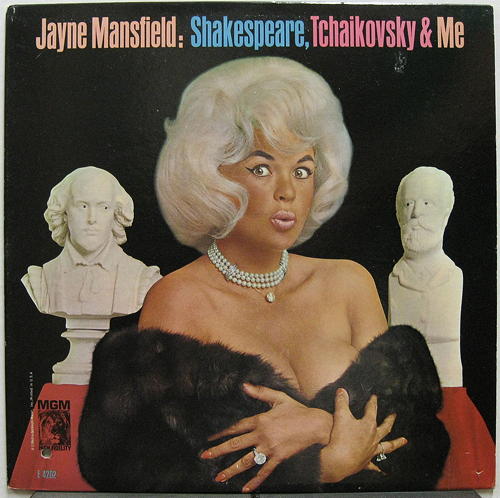
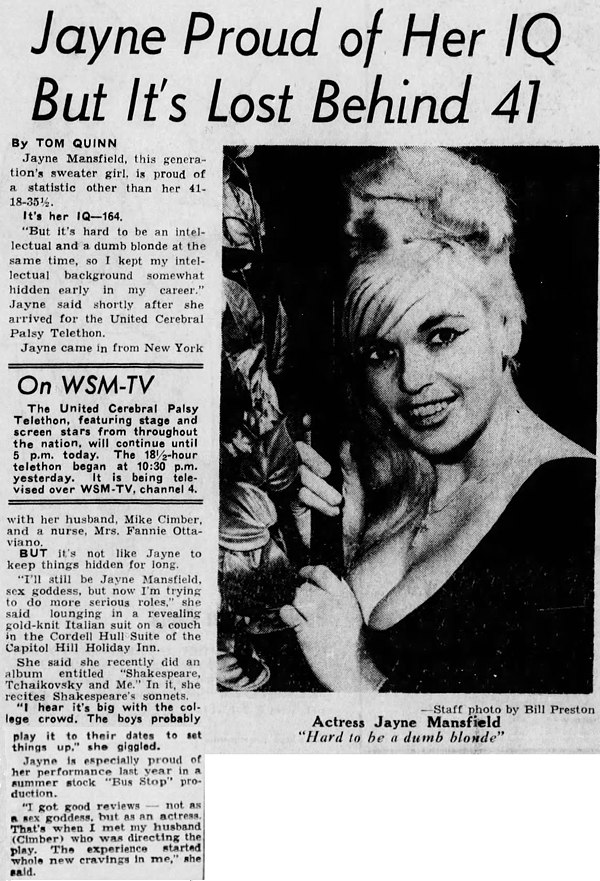
Posted By: Alex - Wed Feb 21, 2018 -
Comments (2)
Category: Celebrities, Poetry, 1960s
Unauthorized dwelling at Yale
Here's one for Paul's unauthorized dwellings theme:Able to afford tuition at Yale, but not housing, 22-year-old Allan Kornfeld lived surreptitiously in a ventilation shaft for seven months, from 1963 to 1964.


Appleton Post-Crescent - Jun 18, 1964
Posted By: Alex - Tue Feb 20, 2018 -
Comments (3)
Category: Unauthorized Dwellings, 1960s
MONTEZUMA: the Opera
Ambitious failure, or noble travesty? Decide for yourself!
"The opera contains human sacrifice, burning at the stake, stabbing, stoning, rule by terror, cannibalism, a love story, war, homesickness, intrigue, a ritual dance, and the supernatural...[T]he opera's greatest defect is its libretto, a 'farrago of poetasty', which is 'a ghastly example of self-parody that even a Robert Benchley could not have topped.'"
Source of quote.
Posted By: Paul - Fri Feb 09, 2018 -
Comments (1)
Category: Ineptness, Crudity, Talentlessness, Kitsch, and Bad Art, Music, 1960s, North America, Cacophony, Dissonance, White Noise and Other Sonic Assaults
Afraid she’d look like a horse
At the International Beauty Congress held in Los Angeles in August 1963, when Miss Luxembourg (Catherine Paulus) learned during rehearsals that she was expected to appear in a bathing suit during the contest, she started laughing hysterically and was reported to have said, "I will look like a horse. The people will all laugh at me. And then I will laugh. I can't do it... I can't do it."The judges had to give her a tranquilizer to calm her down.
Somehow she was nevertheless talked into wearing a bathing suit the next day. And, of course, because of her outburst the picture of her wearing it then ran in papers nationwide.
She received a round of applause during her appearance, but didn't make it through to the finals. However, she was awarded the title of "Miss International Friendship" during the contest.

Detroit Free Press - Aug 16, 1963

image: historicimages.com
clipping: Corsicana Daily Sun - Aug 19, 1963
Posted By: Alex - Thu Feb 08, 2018 -
Comments (1)
Category: Awards, Prizes, Competitions and Contests, 1960s
The Presidential Comedy Albums of Earle Doud
Everyone knows the famous JFK-Vaughn Meader album. But how many realize the producer Earle Doud went on with that theme, to much less acclaim?I can't seem to find any clips on YouTube of the later ones.
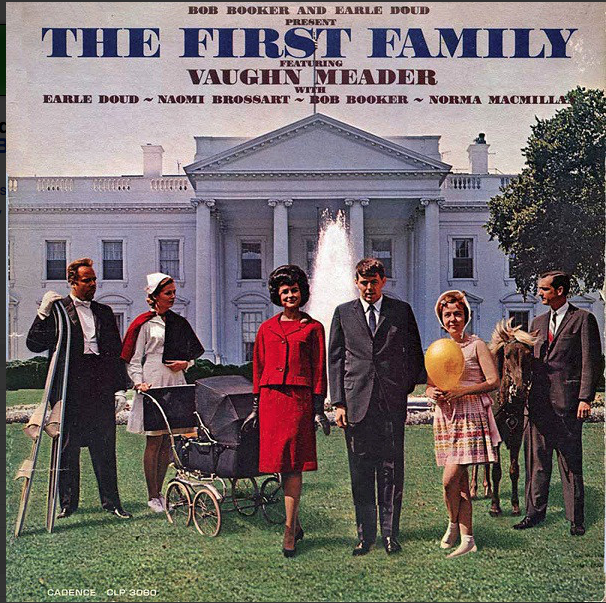
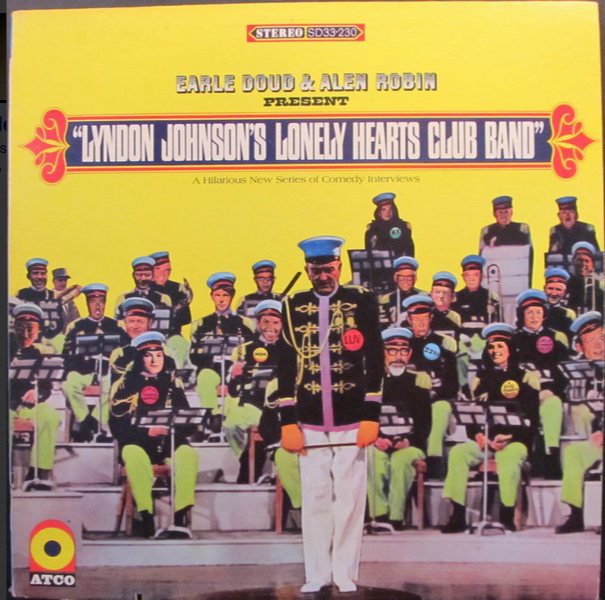
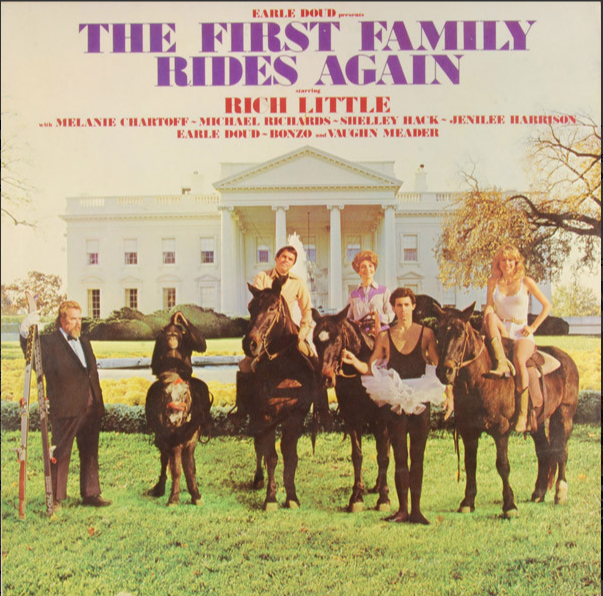
Posted By: Paul - Thu Feb 08, 2018 -
Comments (3)
Category: Government, Humor, 1960s, 1970s, 1980s
The editor who featured herself
The undergrads at Tampa University had major complaints about their 1967 yearbook. For a start, all their yearbook photos were destroyed in a warehouse fire. So they didn't appear in it at all. And then, the yearbook they got was dominated by pictures of one person, the yearbook editor Carmen Gonzalez. Her picture appeared 24 times in it, including a six-page spread devoted to her as yearbook queen.When people complained, Gonzalez explained, "I got into every section because I was in everything." She elaborated that she was not only yearbook queen, but also belonged to at least 10 clubs, was named a member of Who's Who, and had the highest scholastic average at the university. Therefore, it was only natural that she gave most coverage to herself.
The students responded by holding a rally at which they burned 500 of the 2000 yearbooks that had been printed.
Sounds to me like Gonzalez was a woman ahead of her time. She would have thrived in the age of social media.

Racine Journal Times - May 27, 1967

The Tampa Tribune - May 27, 1967
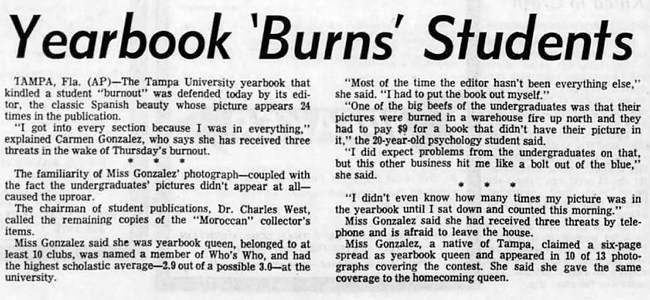
Battle Creek Enquirer - May 27, 1967
Posted By: Alex - Wed Feb 07, 2018 -
Comments (4)
Category: 1960s, Universities, Colleges, Private Schools and Academia
Salad Beauty Treatment
Posted By: Paul - Tue Feb 06, 2018 -
Comments (1)
Category: Beauty, Ugliness and Other Aesthetic Issues, 1960s, Europe
Robert F. Kennedy Bubble Gum Cards
After the assassination of Robert F. Kennedy in June, 1968, the Philadelphia Chewing Gum Corp. rushed out with a commemmorative, 55-card set of RFK bubble gum cards. It presented "the story of Robert F. Kennedy... with bubble gum."Kids must have been rushing out to get these.
The cards seem to have appreciated reasonably well in price. Individual cards now range from $3 to $26 in price. You can get an unopened pack for about $65.

image source: Huggins and Scott


Bridgeport Post - Aug 28, 1968
Posted By: Alex - Mon Feb 05, 2018 -
Comments (2)
Category: Collectors, 1960s
The mustard theory of heart disease
Given that just about everything one can possibly eat seems to be bad for you, I'm not sure if Dr. Jackson Blair was a crackpot or ahead of his time with his theory that mustard is the secret cause of heart disease.But for Blair, mustard was just the tip of the iceberg. It was "part of a wider theory that condiments—pepper, ginger, mustard and mayonnaise, which contains mustard—cause hypertension."
As with everything, I suspect how much of it one eats might play a role.
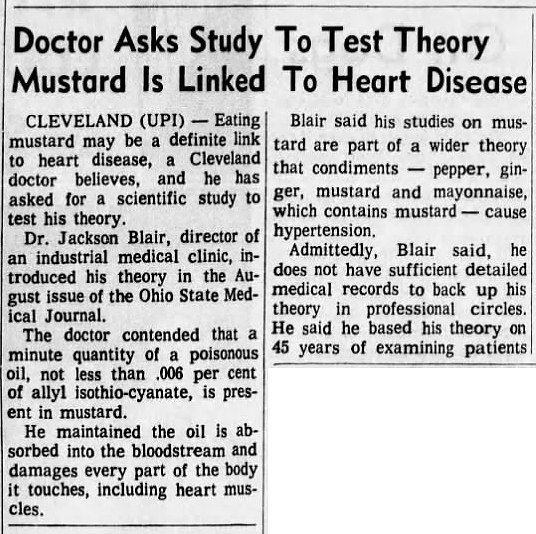
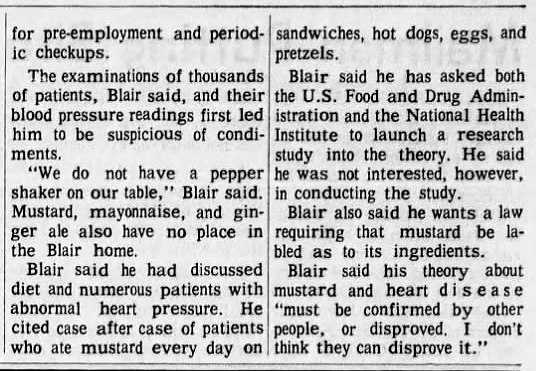
Palladium-Item and Sun-Telegram - Sep 2, 1965
Posted By: Alex - Sun Feb 04, 2018 -
Comments (0)
Category: Food, 1960s, Disease
Follies of the Madmen #350
"Telltale beverages" = booze.
Posted By: Paul - Sat Feb 03, 2018 -
Comments (3)
Category: Business, Advertising, Products, Hygiene, 1960s

| Who We Are |
|---|
| Alex Boese Alex is the creator and curator of the Museum of Hoaxes. He's also the author of various weird, non-fiction, science-themed books such as Elephants on Acid and Psychedelic Apes. Paul Di Filippo Paul has been paid to put weird ideas into fictional form for over thirty years, in his career as a noted science fiction writer. He has recently begun blogging on many curious topics with three fellow writers at The Inferior 4+1. Contact Us |




